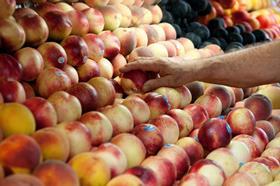
The hype around the first full season of US stonefruit imports might be proving too much for the Australian market to handle.
Australian importers were encouraged by the prospects for US-grown peaches and nectarines, following the success of an abbreviated season last year, which began almost as soon as market access was instated in July.
This potential was affirmed when ten Californian packhouses registered to prepare fruit for the Australian market this season, a significant improvement on the three companies that registered last year. As a result, there has been a steadily increasing supply of Californian stonefruit entering Australia since early May.
However, with leading retailers Coles and Woolworth managing their own import programmes, and wholesale avenues across the country nearing their finite limits, there are fears the stonefruit market could soon become saturated.
“Demand for Californian peaches and nectarines has been quite strong, but the market looks to have reached a high point early then crashed out,” says Neil Barker, managing director of Melbourne-based importer-exporter BGP International. “Some private importers have simply brought too much fruit into the market. The trouble is, with the cost of airfreight from the US being so high, you’ve got to sell at a reasonable price, and with too much fruit in the market that becomes difficult.”
Importers have also had to contend with an abundance of clingstone fruit, which is near impossible for consumers to cut in half. John Baker of Produce Marketing Australia, who is managing a promotional campaign of behalf of the Californian stonefruit industry, says this has done little to deter interest in the category.
“From the feedback we have received, the majority of the fruit has been of good eating quality and has sold really well,” Baker told Asiafruit. “What we have been told from the Californian end is that initial volumes this season are on par with those we saw during the shorter season last year. These volumes are set to ramp-up as the later season varieties come into production. Likewise, we are likely to see more freestone fruit as the season wears on, which should please consumers and drive sales growth.”
Baker is hopeful Australia will grant market access for US plums over the coming months, which would pave the way for a small volume of fruit to be shipped at the conclusion of the current season.



